The Church At Ephesus by C. R. Oliver (top 10 inspirational books .txt) 📕
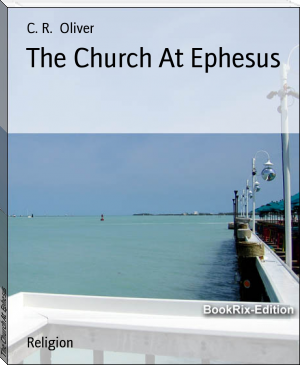
- Author: C. R. Oliver
Book online «The Church At Ephesus by C. R. Oliver (top 10 inspirational books .txt) 📕». Author C. R. Oliver
The Church At Ephesus
Revelation 2:1-7
Introduction:
This month's study is about the church at Ephesus. Because this church was so intimately considered in Paul's travels and because it occupies more than nineteen separate passages in the New Testament, it stands out in importance. In Acts, the hardships of ministering in that area are well documented. In the book of I Corinthians (which some believe was written from Ephesus), Paul makes reference to it. Timothy was commissioned to go to Ephesus and "straighten out" the mélange of false ideologies forming there. Finally, Revelation addressed Ephesus' struggles, commended its progress and challenged its loss of first love.
Having four very different references from which to view this congregation, the reader has an advantage that is not readily available for the other six churches of Revelation. Ephesus was the first to be called up for appraisal. (Thyatira and Laodicea had brief contact with Paul through Lydia [Acts, met Paul at Philippi] and Epaphras [Col. 4]).
Exposition:
Ephesus in Revelation:
Focal Scripture: Revelation 2:1-7
"To the angel of the church of Ephesus write, 'These things says He who holds the seven stars in His right hand, who walks in the midst of the seven golden lampstands: 2 "I know your works, your labor, your patience, and that you cannot bear those who are evil. And you have tested those who say they are apostles and are not, and have found them liars; 3 and you have persevered and have patience, and have labored for My name's sake and have not become weary.
4 Nevertheless I have this against you, that you have left your first love. 5 Remember therefore from where you have fallen; repent and do the first works, or else I will come to you quickly and remove your lampstand from its place - unless you repent. 6 But this you have, that you hate the deeds of the Nicolaitans, which I also hate.
7 "He who has an ear, let him hear what the Spirit says to the churches. To him who overcomes I will give to eat from the tree of life, which is in the midst of the Paradise of God."'
As one segments these verses, it becomes apparent that the Lord Jesus has intimate knowledge of what is going on within the church community. What is interesting are those things that are meaningful to Him in light of what Acts and Timothy emphasize. Take a moment to review in sequence what Jesus says to them.
The assertion: I have walked into and through the midst of your congregation. I am present even though unseen.
(In other words, I was there when the riots started; I was there when the arguments among factions broke out; I was there when the false apostles and prophets came in. I watched how you handled each intrusion to the purity of the Word and the gospel message. I get deeply involved where My Name is used.)
"I know your works, your labor, your patience, and that you cannot bear those who are evil. And you have tested those who say they are apostles and are not, and have found them liars. 3 and you have persevered and have patience, and have labored for My name's sake and have not become weary."
(Shortly, we will review the Acts passages and it will become clearer why Jesus emphasized these factors. Also, when one reads the Epistle to the Ephesians, evidence of these underlying factors will be visible in the teachings. This makes the passage, "Don't be weary in well doing," take on a new fervor. He is watching.)
"Nevertheless I have this against you, that you have left your first love. 5 Remember therefore from where you have fallen; repent and do the first works, or else I will come to you quickly and remove your lampstand from its place - unless you repent"
(Paul, when he first encountered the Ephesian disciples, pointed out to them the first order of business was winning the lost. Doctrinally, he taught them the crowned Christ and how the Christian's continuous awareness must be of Christ and what He has done for them. Loving Him and loving God, the Father, and living by the Spirit sums up his epistle.)
"But this you have, that you hate the deeds of the Nicolaitans, which I also hate."
Adam Clarke commented on Nicolaitans thusly,
Nicolaitanes: These were, as is commonly supposed, a sect of the Gnostics, who taught the most impure doctrines, and followed the most impure practices.
They are also supposed to have derived their origin from Nicolas, one of the seven deacons mentioned Acts 6:5 ... The Nicolaitanes taught the community of wives, that adultery and fornication were things indifferent, that eating meats offered to idols was quite lawful; and mixed several pagan rites with the Christian ceremonies.
(from Adam Clarke's Commentary, Electronic Database. Copyright (c) 1996 by Biblesoft)
Ephesus was offered (along with all who overcome) to eat of the tree of life in the midst of the paradise of God if they turned back to their first love. Yes, they had endured pain and suffering from the evil doers. Yes, they had overcome so many invasions they were seasoned warriors for Christ, but the erosion of their first love had blinded their spiritual perception. Focusing on "overcoming," they had lost contact with what mattered to the Savior. (Could this be said of today's church?)
Ephesus in Acts
:
Background: The Book of Acts, chapters 19-20.
Acts 19:1-20:3
And it happened, while Apollos was at Corinth, that Paul, having passed through the upper regions,came to Ephesus. And finding some disciples 2 he said to them, "Did you receive the Holy Spirit when you believed?"
So they said to him, "We have not so much as heard whether there is a Holy Spirit."
3 And he said to them, "Into what then were you baptized?"
So they said, "Into John's baptism."
4 Then Paul said, "John indeed baptized with a baptism of repentance, saying to the people that they should believe on Him who would come after him, that is, on Christ Jesus."
5 When they heard this, they were baptized in the name of the Lord Jesus. 6 And when Paul had laid hands on them, the Holy Spirit came upon them, and they spoke with tongues and prophesied. 7 Nowthe men were about twelve in all.
Because Ephesus had a synagogue, it could be assumed these disciples were Jews and had heard Apollos preach John's baptism.
Acts 18:24-28 Now a certain Jew named Apollos, born at Alexandria, an eloquent man and mighty in the Scriptures, came to Ephesus. 25 This man had been instructed in the way of the Lord; and being fervent in spirit, he spoke and taught accurately the things of the Lord, though he knew only the baptism of John. 26 So he began to speak boldly in the synagogue. When Aquila and Priscilla heard him, they took him aside and explained to him the way of God more accurately. 27 And when he desired to cross to Achaia, the brethren wrote, exhorting the disciples to receive him; and when he arrived, he greatly helped those who had believed through grace; 28 for he vigorously refuted the Jews publicly, showing from the Scriptures that Jesus is the Christ.
These disciples (perhaps of Apollos) stood out from among the other Jews as Paul preached in the synagogue. Paul taught these twelve true baptism, showing the death, burial and resurrection of Jesus and themselves with Him. Paul laid hands on them to receive the Holy Spirit, and they manifested their baptism by speaking in tongues and prophesying (the testimony of Jesus Christ is the Spirit of prophecy).
Neither Paul nor his disciples lasted more than three months in the Ephesian synagogue. The twelve taught others "the Way." Before long, persecution began. "The Way was evil spoken of," because the power elite deemed it contrary to "their way." (How often this is the case today. Consider the oxymoron, "tongue talking Baptist.")
Paul took his disciples and resorted to a building housing Tyrannous' school. Once again, the Apostle proved his calling and opened a venue to those beyond the reach of established religion.
Acts 19:10 And this continued for two years, so that all who dwelt in Asia heard the word of the Lord Jesus, both Jews and Greeks.
Miracles broke out in their midst, handkerchiefs were anointed and people were healed simply by touching them. Jewish mystics began to evoke the Name and found themselves bludgeoned by demons. Yet these demons were being cast out by the humblest of converts.
Acts 19: 17 This became known both to all Jews and Greeks dwelling in Ephesus; and fear fell on them all, and the name of the Lord Jesus was magnified. 18 And many who had believed came confessing and telling their deeds. 19 Also, many of those who had practiced magic brought their books together and burned them in the sight of all. And they counted up the value of them, and it totaled fifty thousand pieces of silver. 20 So the word of the Lord grew mightily and prevailed.
So significant were these transactions that it disrupted the economy of the area. Silversmiths, casting companies and retailers began losing customers and income due to the preaching of this growing group. (Any time true revival grasps a community then evidences, like those in Ephesus, sweep the public arena.)
Acts 19: 23 And about that time there arose a great commotion about the Way. 24 For a certain man named Demetrius, a silversmith, who made silver shrines of Diana, brought no small profit to the craftsmen. 25 He called them together with the workers of similar occupation, and said: "Men, you know that we have our prosperity by this trade. 26 Moreover you see and hear that not only at Ephesus, but throughout almost all Asia, this Paul has persuaded and turned away many people, saying that they are not gods which are made with hands. 27 So not only is this trade of ours in danger of falling into disrepute, but also the temple of the great goddess Diana may be despised and her magnificence destroyed, whom all Asia and the world worship."
(Please remember that Jesus was accused of proclaiming the overthrow of both Temple and Emperor. Remember that all of Jesus' disciples ran into difficulty with authorities, both political and religious. Remember that Paul was imprisoned because of these forces.
Note also, the mother-goddess, Diana, was contrasted by Paul in his Ephesian letter by his teaching on the creator, the son and the saints. Much of the work in the book of Ephesians refute false teaching and replaces it with sound theology.)
Listen to pagan logic:
Acts 19:35-36
The city clerk quieted the crowd and said: "Men of Ephesus, doesn't all the world know that the city of Ephesus is the guardian of the temple of the great Artemis and of her image, which fell from heaven? 36 Therefore, since these facts are undeniable, you ought to be quiet and not do anything rash."
(Today, citadel cities, acting as guardians of false gods, still exist. Take the Vatican for instance, Roman Catholics have replaced Diana with Mary, as a type of mother-goddess. They have sainted and canonized and introduced mysticism and paganism into Christian worship as well.)
(Review Clarke's comment:
Many of the Italian papists believe that the shrine of our lady of Loretto was also a divine gift to their country. [Meaning: coming directly from heaven.]
(Further Comment:
Most of the outcries that have been made against all revivals of religion--revivals by which the church has been called back to its primitive principles and purity, have arisen out of self-interest. Ephesus had a real, old-fashioned, revival!)
After this disturbance, however, Paul departed. The riot over
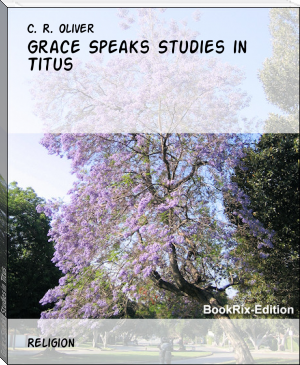
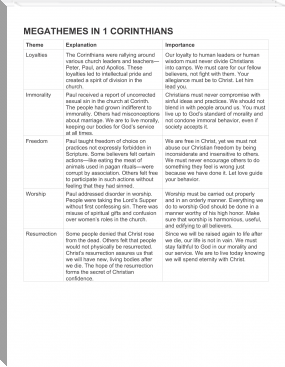
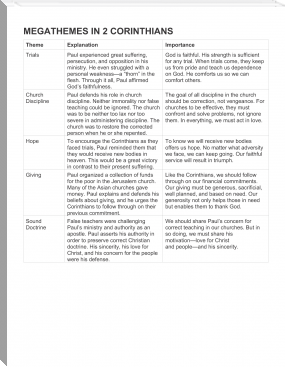

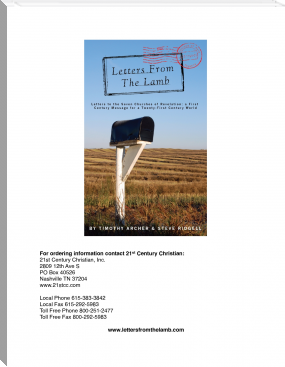
Comments (0)